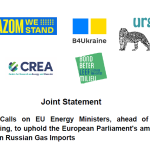EU certified olive oil NOT coal for the future of Milas, Turkey
-
Research findings show potential benefits for the local economy by investing into olive oil production in the Milas region
-
However, recently enacted law in Turkey is threatening olive groves for the sake of coal mine expansion
Muğla, Turkey 15 April 2022 – Investing into olive oil production and manufacturing in the Milas region would reap healthy new investments for the local economy, outlines the new report “Transition Opportunity for Local Economy: Olive Sector in Milas, Muğla, Turkey”. However, a recent and unpopular legislation change in Turkey has made olive groves more vulnerable as it allows cutting down olive trees for the expansion of coal mines. Implementation of the new legislation has begun with the coal company already cutting olive trees last week in Milas, where two coal plants are in operation.
Turkey ratified the Paris Agreement last year and committed to be net zero by 2053. This commitment requires economic transition of the coal regions. For Milas (Muğla, Turkey) which is a coal region, an olive based economic development can be an option for transition, according to the study.
The report, launched by the Milas City Council, Climate Action Network Europe (CAN Europe) and 350 Turkey, evaluates the potential to construct a number of manufacturing and processing facilities that could process 20.000 tonnes of olives which are currently being exported from Milas, instead of contributing to the local economy.
The investment needed for these manufacturing and processing units, which could create 685 new jobs, is equivalent to the state subsidies granted to the two coal-fired thermal power plants in Milas, over the course of just one year. Also, by supporting an olive-based economy in the region, the local revenues from EU certified Milas olive oil can increase from 0.4 million Euro to 5,7 million Euro (based on 2021 average rates). Milas olive oil is Turkey’s only olive oil that has a European Union registered geographical indication.
Özlem Katısöz, Climate and Energy Policies Coordinator for Turkey at the Climate Action Network Europe (CAN Europe): This study shows that a regional transformation, in line with Turkey’s 2053 net zero target, is possible and realistic by revealing the potential of the olive sector alone in Milas. If we want to build a future for Milas, olive groves must not be destroyed for the sake of the coal mine. On the contrary we should cherish the benefits they could offer to the local economy.
Çağlayan Üçpınar, the President of the Milas City Council: For the sake of short-term gains, thousand-year old olive trees are under threat together with the culture that we live in and that we strive to keep alive. The study presenting the opportunities of a local olive economy shows that another future is possible for the Milas region and its citizens.
Efe Baysal, Campaigner at 350.org Turkey: The olive tree has been the symbol and blessing of Anatolia and Milas for thousands of years. Today, unfortunately, it is under the threat of coal mining to supply the two coal power plants in Milas. As the new report signifies, a local economy that will be organised around olive cultivation, instead of a coal-dependant economy, is a great opportunity for the region: an economy that will honor the culture of Milas with its olive route as well as ancient Caria route; that will activate the gastro-tourism potential of Milas; that will protect the natural ecosystem by transforming the livelihoods of the people of Milas – all of this is possible.
–ENDS–
The key findings of the report are as follows:
-
An average of 100 thousand tons of olives are harvested annually in the Milas region, but one-fifth (20.000 tons) of this goes is taken out of the local economy as unprocessed olives without creating any additional value for Milas.
-
50 olive-processing units, 15 olive-oil units and 5 soap-shampoo manufacturing units can be established in order to make use of the 20 thousand tons of olives. With the new facilities, 685 new jobs would be created, almost equal to the permanently employed in the coal mines of Milas.
-
The cost of this investment (23 million Euro based on 2021 price estimates) can be compensated with a one-year state subsidy (capacity mechanism payment) of 25 million Euro to the two coal-fired thermal power plants in operation in Milas.
-
If the necessary promotion and certification processes are implemented, the production of 100 tons of Milas olive oil certified with the EU registered geographical indication would increase by eight times. The value created by the EU certified olive oil may increase 0.4 million Euro to 5,7 million Euro at 2021 prices.
-
Milas is the capital of olives and olive oil in Turkey. It is a region where people have been settled for 5,000 years, cultivating olives and producing olive oil for 4,000 years since the Carian Civilization. Turkey is located on the Olive Tree Route, recognised as the Council of Europe Cultural Route. Shaping the new economy around olive production would turn Milas into an attractive gastro tourism destinatio
CONTACT
Özlem Katısöz, Climate and Energy Policy Coordinator for Turkey, Climate Action Network Europe, +905322042570 ozlem.katisoz@caneurope.org
Efe Baysal, Campaigner, 350.org Turkey, +905325907776 efe@350.org
Press conference:
The report is publicly presented at a press conference held at the Milas Municipality Prof. Dr. Aşkıdil Akarca Hall (Muğla, Turkey) on 15th April 2022, 10.00 CET.




